Collecting Delaware Books
Victor Thaddeus of Ardentown, 1895-1974
Contents
Victor Thaddeus was a Delaware author who lived in the Ardens from the 1920s until his death in 1974. He wrote both historical biography and short stories. He was part of the flowering of literature that occurred in Delaware in the 1920s and 30s. Both his parents influenced his writing and his approach to life.
Childhood
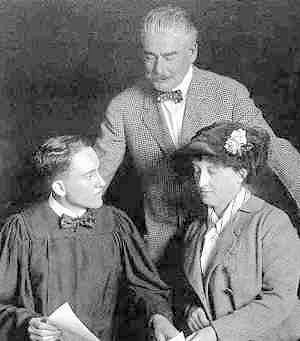
at his college graduation
Victor Thaddeus' father was born in Ireland in 1860 as Henry Thaddeus Jones. He became a successful artist and began calling himself Henry Jones Thaddeus and occasionally Harry Jones Thaddeus. In some art listings the "Jones" becomes "John." Two books about him are listed in References below.
Henry produced oil paintings and watercolors of all types, but most of his income was from society portraits. He was commissioned to paint official portraits of Pope Leo XIII in 1885 and Pope Pius X (now a saint) in 1903. His paintings sell today for as much as $100,000. He lived and painted all over the world, including England, Wales, France, Italy, Egypt, Algeria, Australia, and the United States.
In 1893 Henry married Mary Evelina Julia Grimshaw Woodward, known as Eva, of a respected Irish family. She had divorced Thomas Woodward, leaving behind three daughters. Henry and Eva had two children, Frederick and Victor. Victor was probably born in 1895, but there is some confusion due to the scandal of the divorce. Eva has been called an aristocratic bohemian and traveled for long periods with wealthy friends.
The family had several happy years in Wales, but both parents traveled frequently. The boys spent considerable time in British boarding schools. About 1907, the family moved to the United States and settled in Coronado, California, near San Diego. Henry had his studio in the famed Coronado Hotel. They soon moved to the artists' colony at Carmel near San Francisco. Fellow residents included Jack London and Ambrose Bierce. Jack London frequently visited the family.
Victor expressed interest in a writing career, but his parents, knowing the difficulties of an independent artist, insisted he get a college degree. He graduated with a degree in chemistry from the University of California at Berkeley in 1916.
Victor and his brother stayed in the U.S. when the parents moved back to England about 1918 and later separated. Eva had a successful writing career and continued her aristocratic friendships. Henry died in 1929 in relative obscurity. Eva died in 1946, leaving her estate of £ 8,000 to Victor.
Victor's older brother Frederick or "Freddy" was disowned by his parents, apparently for a marriage they did not approve of. Freddy was not mentioned in his mother's will. However, Victor kept in touch with him over the years.
Victor at the Ardens
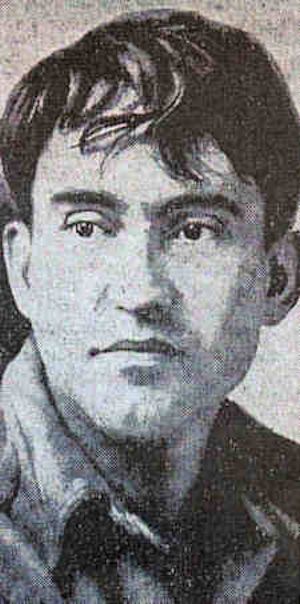
from 1935 newspaper photo
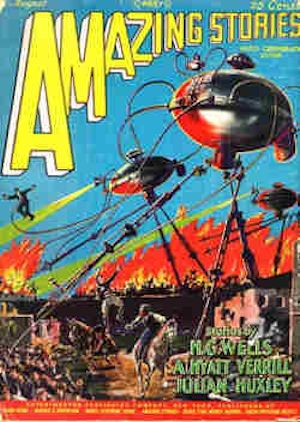
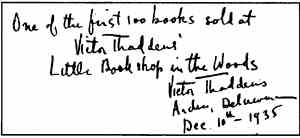
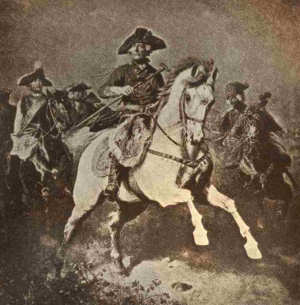
Victor took a job as plant chemist with General Chemical in Bay Point, California. He enlisted in the California Grizzlies, a volunteer regiment, and served two years in the Army during World War I. After the war, General Chemical stationed him on at a Long Island research facility and then at Marcus Hook, Pennsylvania. In 1920 he was living in a rooming house in Ridley Park Borough, Delaware County, Pennsylvania, along with five other young technical and clerical workers. He had a horse and used to ride the back roads.
One day he rode dirt roads from Delaware County into the state of Delaware and discovered the town of Arden. He saw Arden as an artists' colony, not as a single-tax showcase community. He admired the "simple communal happiness coupled with a splendid self-reliance." There was no electricity, running water, or paved roads. In a reminiscence written for the Wilmington Sunday Star in 1935, he said he had never seen an eastern fall before. (Neither California nor Europe have the flaming autumn colors.)
Soon he was rooming in the Arden home of elderly widow Pauline Arlt, with a reasonable rent, paid in part with garden work and wood chopping. He decided to quit his chemist's job and try to live by writing alone. Success was almost immediate. He had a story, "The Sandalwood Doll," published in a national publication in 1921. He received $30 for it, (equivalent to $350 in 2006). He sold another story that year and had at least seven short stories in major magazines in 1922.
One of those magazines was The Smart Set, edited by H.L. Mencken and George Jean Nathan. It called itself the "the magazine of cleverness" and specialized in new authors. Eugene O'Neill, Theodore Dreiser, Henry James, F. Scott Fitzgerald, and Wilmingtonian Alice Dunbar Nelson got some of their first exposures in the publication. Thaddeus and Mencken formed a lifelong friendship that included regular correspondence and even Christmas phone calls.
He had many literary friends in addition to Mencken. He was regularly a guest at the home of publisher John Farrar of Farrar & Rinehart, Inc. where he once found himself sitting on the floor having a drink with new author William Faulkner. Delaware's John Biggs, Jr. was a frequent visitor to the Thaddeus home.
One unusual story was his "The Chemical Magnet," published in the science fiction magazine Amazing Stories in August 1927, the same issue that carried a reprinting of H.G. Wells' famous "The War of the Worlds" and a new story, "The Tissue-Culture King" by Julian Huxley. The text of Victor's story is on microfilm at the University of Delaware Morris Library.
About this time, Victor built his own house by hand, the first house in Ardentown. (Arden was founded in 1900, Ardentown in 1922, and Ardencroft in 1950. They are collectively "The Ardens.") It started as a one-room cabin but was add to year by year. Arden patriarch Frank Stephens was instrumental in convincing him to build.
During the late 1920s, Victor turned to more serious writing. He wrote historical biographies of Voltaire, Frederick the Great, Benvenuto Cellini, and Julius Caesar. They were well written and well researched using a number of older literary sources. He apparently traveled to London and Paris for the research but returned to Ardentown for the final writing. Three were published by the prestigious Brentano's of New York. A fourth was published by Farrar & Rinehart of New York when Brentano's went bankrupt during the depression. Voltaire, A Genius of Mockery, 1928, was especially well received and provided income for a number of years. Victor renewed his copyright on this and other books in 1956. It was reprinted in paperback in 2003. His biography of Julius Caesar was illustrated by Wilmington artist William D. White.
His writing has a colorful 1920s style. His biographies are all good storytelling. A distinctive mannerism, especially in the Voltaire book, is switching often to the present tense as if the author were there. It adds immediacy.
Victor met and married Elizabeth "Libbie" Ross. She had moved with her parents to Arden from Fairhope, Alabama, the other Henry George single-tax community, founded in 1894. Elizabeth took part in amateur theater in Arden. Victor fell in love with her when he saw her as Shakespeare's Titania, leading the fairies onto the stage of Arden's early woodland theater. The couple had two children, Dierdre and Patrick.
Victor worked at various odd jobs for additional income to support a growing family. He worked in the advertising departments of Hercules Powder Company and Standard Oil of New Jersey. He did rewrite for the Sunday Star in Wilmington. He had serious financial problems just before the birth of his daughter. He was behind in his land rent and the trustees were threatening him with cancellation of the lease. For a time the family lived in a tool shed equipped for living and rented out the house.
Part of the problem was Ardentown's need to contribute a share of road paving expenses. The Works Progress Administration (WPA) gave work to thousands of the unemployed building roads, schools, and national parks. Ardentown entered into an agreement with the WPA to pave the cinder streets. Victor objected loudly. It is not clear whether Victor threatened to move away or was threatened with eviction. Eventually problems were worked out.
According to his son, Victor was not good with money and was a "financial sucker." During the Great Depression, Victor tried many ways to increase income. He opened "Victor Thaddeus' Little Book Shop in the Woods" in his home around 1935. In addition to his own books, he sold early works by Lawrence of Arabia and Sinclair Lewis. Quality toys and magazines such as the French publication Minotaur were also planned. The shop was not a big success, but Delaware collectors prize books with its shop label or "bookseller's ticket," which one collector describes as "a bit too large."
Victor and Elizabeth separated in 1939. They divorced and Elizabeth remarried Vincent Copeland of Buffalo, New York. Patrick stayed with his father until 1955 when he left home to study abroad as a Fulbright Scholar. He eventually became a professor with the Harvard-Smithsonian Center for Astrophysics. Dierdre moved away with her mother. Dierdre visited her father in 1950 and played Ophelia in an Arden production of Shakespeare's Hamlet, perhaps produced by Bill Frank, a good friend of Victor's. She returned again briefly in 1980 as Dierdre Griswold to announce her candidacy for President of the United States on the Workers World Party ticket advocating "the people's takeover of the oil industry." She was a trade unionist and an anti-war demonstrator.
Victor may have written novels, but none of them were published. It is not known if the manuscripts still exist. However, he did write for the Delaware Federal Writers Project. The Special Collections of the Morris Library holds two interesting Thaddeus manuscripts from this period. One was a play in verse, meant to be performed as an opera by the Federal Theater Project, entitled 'Orrible 'Arry and the Court Tiger. It turns on a Cockney pun. The second is a novella titled Leo Rex meant for theatrical adaptation.
In the mid 1950s, Victor married Maria Pincus. She was born in Argentina of German parents, and lived in Germany through World War II and West Germany until 1953. She had little good to say about the Nazi regime or the postwar government. Maria was a natural storyteller and wrote many letters to the editor about German history and German contemporary politics. Among the letters was a condemnation of the Kent State University massacre, relating it to earlier events in Germany. At home in either English or German, she was considered a professional storyteller and was a speaker for the Delaware Humanities Forum Speakers Bureau, giving talks all over the state as well as in New York, Virginia, and Indiana. She always praised Victor as a storyteller and said he could completely captivate his listeners.
According to his son, Victor took little part in Arden life. He was skeptical of utopias. Despite his lack of interest in the single-tax movement, he said he admired Henry George's Progress and Poverty for "its extraordinary readability." He also was a loner. He could be alternately charming and mean. Usually shy, he could be obnoxious and aggressive when he drank, which was not often. He could be both generous and stingy. His son and daughter were never in his favor both at the same time. It was one or the other. He was a good-looking man, always in good health, and had no lack of success with women.
Victor may not have taken part in Arden politics, but he was a frequent writer of letters to the editor. These letters are surprisingly mild. They condemn the firing of a local postal employee, praise the state police for finding his wallet, or condemn in poetry Senator Morse of Oregon. On the other hand, he had a running feud with a neighbor, Charles W. Pettit. In one instance in November 1935, a dispute over a blocked driveway led to Victor's arrest for disturbing the peace. He was fined one dollar and refused to pay it. Among other things, he said, "I'll drain Ellendale Swamp with a thimble before I will pay a cent." He served one day and part of two others in the New Castle County Workhouse, sweeping floors in prison garb. He liked the prison clothes but complained he was given no underwear.
Victor Thaddeus died Feb. 1, 1974, after a bout with cancer. Today he is a forgotten Delaware writer. However, he is worthy of interest to collectors for the quality of his writing and his love for the Ardens. He is to be admired also as a true rugged individualist.
Books
The following four books by Thaddeus are available inexpensively in the used book market on the Internet.
- Julius Caesar and the Grandeur That Was Rome. 1927. Brentano's, New York.
- Voltaire, Genius of Mockery. 1928. Brentano's, New York.
- Frederick the Great, The Philosopher King. 1930. Brentano's, New York.
- Benvenuto Cellini and His Florentine Dagger. 1933. Farrar & Rinehart, New York.
Stories
This is a partial list of Thaddeus' short stories and articles. Copies of the magazines are sometimes available. Unfortunately, individual issues of The Smart Set from the Mencken era sell for $300 up to $750. The University of Maryland has copies of most issues.
- The Sandalwood Doll, (short story) Argosy All-Story Weekly, Nov 5, 1921, his first story.
- The Man of Camelot, (short story) Argosy All-Story Weekly, Nov 26, 1921.
- The Third Manifest, (short story) Munsey's, Jan 1922
- The Missing Link, (short story) The Smart Set, May 1922
- The Superman, (short story) The Smart Set, Jul 1922
- Mr. Ballinger's Home, (short story) The Smart Set, Aug 1922
- De Profundis, (short story) The Smart Set, Sep 1922
- The Romance of Old Port Shane, (short story) The Smart Set, Oct 1922
- Chiaroscuro, (short story) The Smart Set, Dec 1922
- The Brightest Spot in Town, (short story) The Smart Set, Mar 1923
- The Happiest Day of Her Life, (short story) The Smart Set, May 1923
- The Dream, (misc. - sketch) The Smart Set, Jun 1923
- The Love Affair of Mrs. Kate Deckle, (short story) The Smart Set, Sep 1923
- The Chemical Magnet, (science fiction) Amazing Stories, Aug 1927
Poetry
Victor Thaddeus has been listed as a Delaware poet, however, examples of his poetry are hard to find. Here is one from The North American Book of Verse, vol. 1, page 88.
COME HOME, ICARUS! O give him wings to soar on high! Nearer the sun — Ay! — Into the vast interminable sky! That better, clearer, he may see Sunlight on flower, wind on tree And watch the stream upon its way, And see the children at their play Far down the windows bravely bright In the unfathomable night Watch the plowing of the plain, See the harvest come again Flocks of birds remote below 'Twixt far horizons come and go Ships from harbors safe and still Daring the ocean's august will, Each captain on his little bark Gazing calmly through the dark. And hear, into the skies, Like dream-voices arise, The songs of Earth That gave him birth. Too long he looked away toward the stars, Out and away, As though on Earth were prison bars That made him stay. To rise and see The humbler greater mystery Below, O Give him wings!
Credits
In addition to my own research, information for this article came from Patrick Thaddeus, Steven Leech, Tom Doherty, and Harry Themal. Themal, as a journalist and an Ardentown resident, supplied a great deal of information as well as clippings on Victor's personal life. I thank all who helped. — JPR
References
Much of the biographical information on Victor came from searches of U.S. and British censuses and other records through genealogical Web sites. The first of the two books about Victor's father supplied more. Details were filled from oral information from many people, including those listed in the above credits. Much information about Thaddeus' life in Delaware came from newspapers including the Wilmington Sunday Star and the predecessors of the Wilmington News-Journal. Literary information was obtained by on-line search of library and bookdealer Web sites.
There are two books about Victor's father. A biography, The Life and Works of Harry Jones Thaddeus, by Brendan Rooney was published in 2003 by Four Courts Press, Dublin, Ireland. An autobiography, Recollections of a Court Painter, by H. Jones Thaddeus was published in 1912 by John Lane, London. It was reprinted in facsimile by Elibron Classics in 2005. It has almost no family information and is a collection of stories and tale tales. Perhaps it shows where Victor got his storytelling talent.